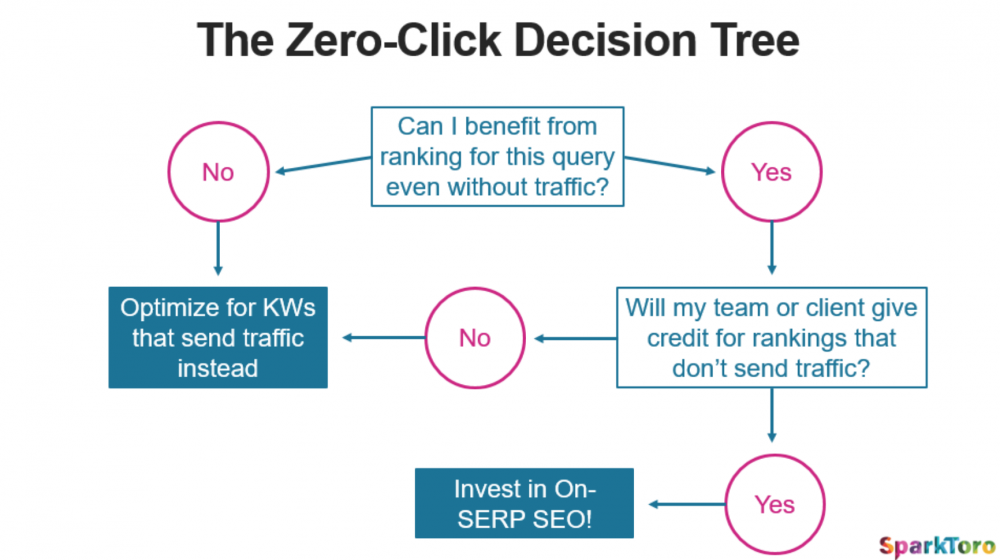As Google starts to provide more and more answers and content directly in their search results page (SERP) anyone with website traffic objectives or measures in their digital strategy needs to take a fresh look.
While fewer than half of all Google results end with a click there’s still an opportunity for your organisation to be found, and to provide to your users, even if you’re not always doing that on your own site. But this is a big change – Google has been the biggest source of referrals and its now keeping more of those for itself. The pressure is on to look at how you’re being found, and work out how to get the most from your organisation as we move toward a time of zero-click search.
Zero-click search?
For a long time Google has been the main source of organic (unpaid) traffic to your website accounting not only for almost 69% of searches on the web, but 66% of web referral traffic. If people were looking for you – knowingly or not – it’s likely their journey started on Google, and if you’d done good work they’d see your web page listed near the top of the results and click on through.
But Google has increasingly moved toward providing answers to search questions within the results page itself, keeping people on Google and not encouraging click-throughs even when you’ve got a high ranking, well matched result. They are packing more info into expanded results – maps, weather, lifting content (like lyrics) directly into the result, showing definitions which mean you don’t need to click through,
The result – by September 2019 56% of mobile searches were zero-click, compared to 39% organic result search clicks. Some players have noticed a 30-70% drop in the referral traffic they get from Google. Desktop fares better (60% organic search clicks, 34% zero clicks) but if you’re traffic is mostly mobile that may not be a big consolation. And all that is before you consider how much of onward search traffic is going to Google-owned sites such as YouTube (spoiler: plenty).
So whether your traffic is on mobile or desktop, whether you’re competing with something Google itself offers or not, the shift away from referral is not something you want to ignore even if you haven’t noticed such a significant impact yet.
Search, traffic and your digital strategy
There’ll be plenty of organisations which have a digital strategy of attracting traffic to their website and doing business with them there. Only a handful of years ago when I was putting in a new digital approach for a public sector org we looked at Google as being the homepage for our website, and considered it the main start point for the majority of journeys. If I were doing the same now I’d need to think not about how people moved from Google to our site, but how Google presented the right information from our site directly in the results (and how we coped with that situation).
Whether you strategy is built on enticing visitors through social media content or making sure you achieve compelling search results it’s time for a refresh – Facebook’s algorithm frowns on links, and now Google displaying more info on the results page all contributes to your website moving further down the list of places online people are likely to go. So, what do you do?

You need to find ways to be relevant to search queries – this means continuing to really understand the search teams and questions, and the intent around them, which is best met with you and your content as a result match. You still need to be doing the hard SEO work to appear high in the results.
You also need to work out whether you can benefit from a search result that is zero-click, one where information is pulled through and displayed on the results page. If so, invest in making sure you’re high up and you’ve optimised that content, if not then it’s time to look for the keywords which still give you traffic and benefit.
And you need to continue to work out how you meet your user beyond search – that means if they are coming to your site you’re giving them a great experience and meeting their needs, and if they aren’t you know where else online you can reach them in the best possible way. Increasingly for the public sector this means bringing in thinking which is more commercial around search and findability online even if it doesn’t always mean finding a budget to get results.
Further reading – this piece and slide deck from Rand Fishkin on how Google went from search engine to competitor is full of useful info.
NEED A HAND?
If you need a hand with anything do get in touch. I’m happy to take a look at what you’re currently doing, share my experience to help you build something new, or come in and share some of my knowledge and skills with you and your team. You can get in touch with me here and find out who else I’ve helped recently here.
You can find the next dates for the Vital Facebook Skills workshops I run with Dan Slee here – I cover what you need to know about Facebook Ads plus we give you the low down on the algorithm, creating great content, engaging in Groups, the purpose of Pages, and knowing when to engage.